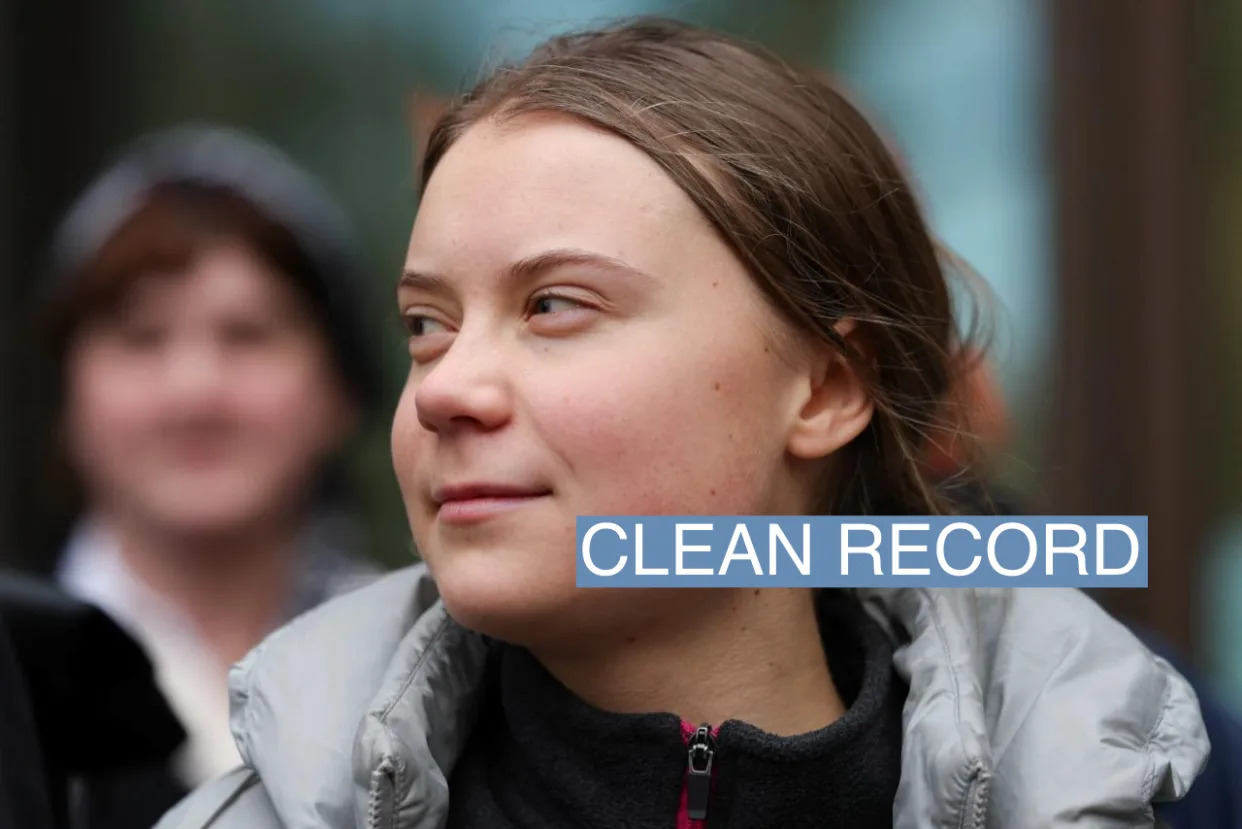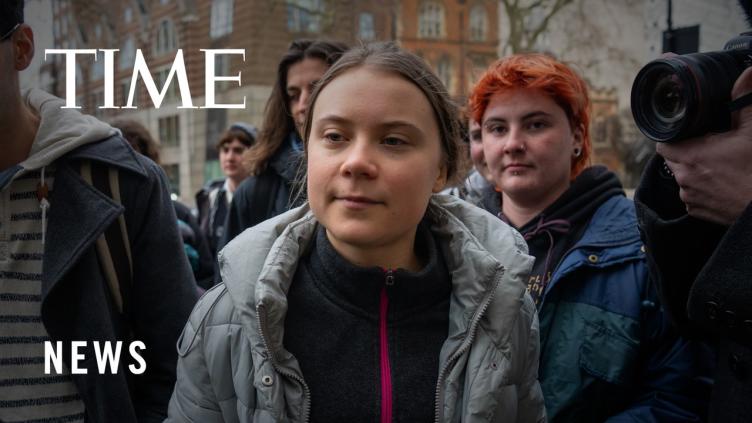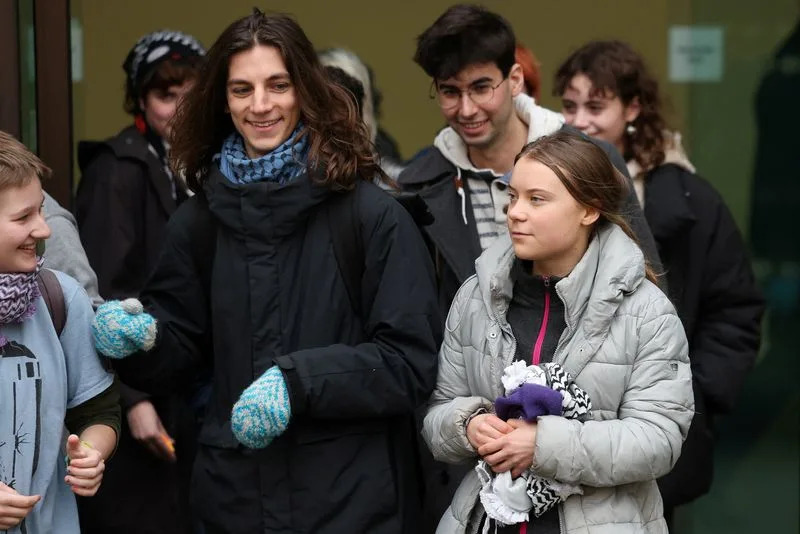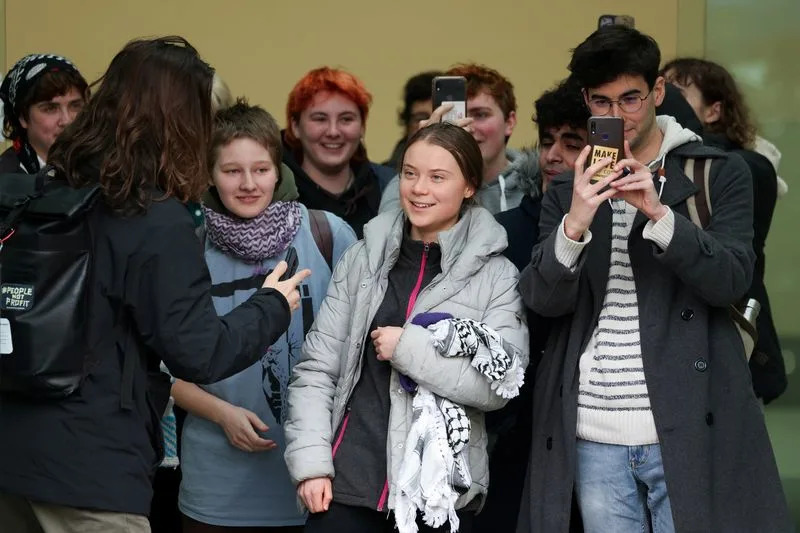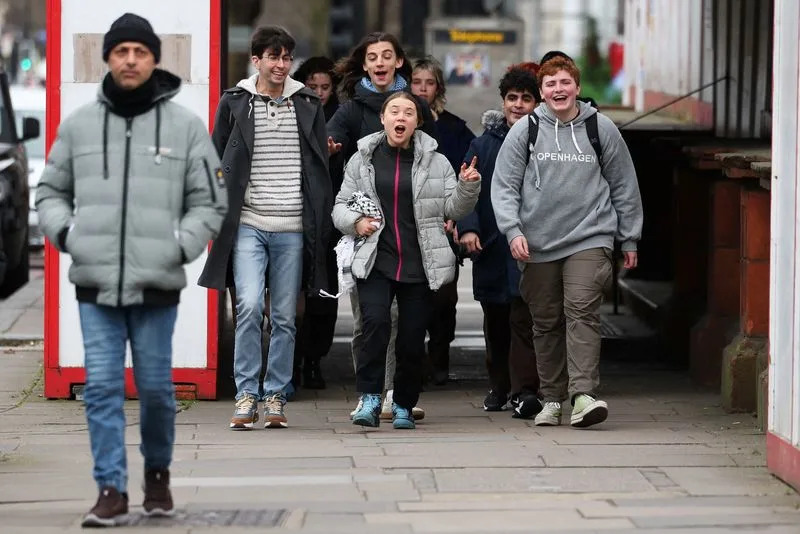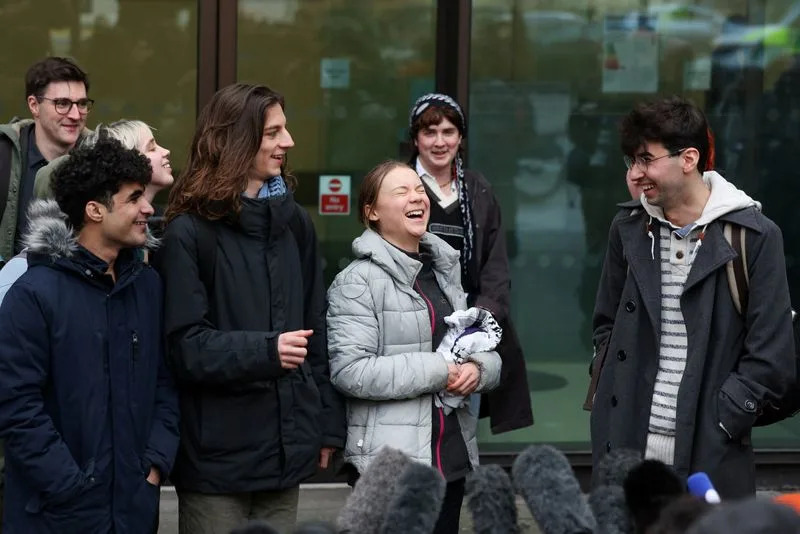A conservative group with a history of climate change denial has hired a German YouTuber to challenge Greta Thunberg's 'climate crisis'
pcachero@businessinsider.com (Paulina Cachero),
INSIDER•February 24, 2020

Naomi Seibt, a German YouTuber, has been hired by a conservative think tank to help spread climate denialism. YouTube
The Heartland Institute, a conservative think tank with ties to the Trump administration, has a history of promoting climate denialism.
Most recently, the organization has enlisted the help of a 19-year-old German YouTuber named Naomi Seibt and framed her as a challenger to climate activist Greta Thunberg.
Although Seibt detested her "anti-Greta" label, she claims that Thunberg and other youth climate activists are spreading views that are not based on science.
Nineteen-year-old German YouTube Naomi Seibt says she, too, once believed the world was in the midst of a global crisis and rallied behind environmentalist policies and the uprising of youth climate activism — but not anymore.
Seibt now finds herself on the warring side of Greta Thunberg's climate justice movement, working for a conservative American think tank with ties to the Trump administration to combat what she claims is "climate alarmism."
"I have good news for you. The world is not ending because of climate change," Seibt says in a YouTube video for the Heartland Institute. "People are being force-fed a very dystopian agenda of climate alarmism that tells us that we as humans are destroying the planet and that we, the young people especially, have no future."
For decades, the Heartland Institute has promoted what it calls "climate realism" and spreading doubts about the overwhelming science supporting human's role in causing climate change. The organization cited "science backing climate realism" from the Nongovernmental International Panel on Climate Change, a riff on the UN's Intergovernmental Panel on Climate Change which they sponsor themselves.
One of its senior fellows, William Happer, objected to a US intelligence official's finding that climate impacts could be "possibly catastrophic" when serving on the White House National Security Council, the Washington Post reported.
The conservative think tank has recently come under scrutiny for its shadowy funding stream through Donors Trust, an organization that has allowed wealthy contributors to donate millions of dollars to conservative causes anonymously. Mother Jones referred to the organization as the "dark-money ATM of the conservative movement."
A recent investigation by German journalists believed they unveiled a plot by the Heartland Institute to utilize Seibt to undermine climate protection measures in Germany — but James Taylor, the director of the Arthur B. Robinson Center for Climate and Environmental Policy at the Heartland Institute, claims the organization has nothing to hide.
"We're always looking to advance individual freedom and better human health and welfare in the United States and around the world," Taylor told Insider. "Even for folks who think they need to undercover to get that information for me. I'll be happy to have that interview today."
In a new effort, the Heartland Institute has enlisted the help of a YouTube influencer to continue to "spread the truth" about climate change. The organization has pitted Seibt against the face of the climate justice movement: Swedish activist Greta Thunberg.
"Greta Thunberg took the world by storm with her doomsday climate predictions. Naomi Seibt, a rising star, advocates for proper scientific discourse over climate change," read a caption on a YouTube video featuring Seibt and Thunberg. "Who seems like the more reasonable advocate to you?"
Naomi Seibt, the self-proclaimed "climate realist"
Seibt's crusade against "climate alarmism" online began in 2019 after Thunberg's activism won her a Nobel Peace Prize nomination and Time Magazine's "Person of the Year" Award, the youngest person to earn the title. In addition to challenging what she calls the "mainstream" climate narrative, Seibt also raised questions about feminism and immigration on her channel that echoed far-right views.
Her views caught the attention of a conservative German think tank with ties to the nationalist Alternative for Germany, and later Taylor.
Taylor saw Seibt speak at a conference in Germany and believed she could help further Heartland's agenda of advocating for "free markets" and "individual liberties."
"Here we have a 19-year-old young lady with tremendous poise tremendous intelligence," Taylor told Insider of its decision to hire Seibt as a digital media specialist. "Essentially, we are helping to provide resources so that she can continue to spread the message advocating individual freedom, which includes economic freedom, as well as climate realism."
Seibt, a former "climate alarmist" herself, claimed her skepticism began with Thunberg's own Fridays for Future movement. While she disagrees with Thunberg, she emphasizes that she is not the "anti-Greta."
"I'm not this evil opposite of Greta — she might be a really nice girl and I would love to talk to her someday," she told Insider.
However, Seibt claimed Thunberg and other youth climate justice activists espouse views that are not based on science.
"The main issues that I have with the climate change is the narrative. There's a lot of fear-mongering going on. Climate change is not something we're allowed to question anymore," Seibt said.
She said her own research suggests that the role of manmade greenhouse gas emissions in destroying the planet has been inflated by the UN's Intergovernmental Panel on Climate Change. The international body is made up of world-renowned scientists who have reached a consensus on the detrimental effects of human greenhouse gases and contribute to reports on how to mitigate climate change.
"I do not believe that the climate is changing because of manmade CO2 emissions. And if it was, I don't believe that would have such a detrimental effect," Seibt told Insider, who did not cite where her own research derived from.
While the 19-year-old believes that the climate is, in fact, changing, she protested the hysteria around the impending climate crisis. Seibt claimed that the widespread fears about the effects of climate change have not only caused "eco-depression," but has effectively silenced any dissent about the climate crisis.
"To be a scientific skeptic has nothing to be with an authoritarian radical," Seibt, who identified as Libertarian, said.
"We are not allowed to speak up — people are losing their job in the wake of this supposed 'climate crisis.'"
With the Heartland Institute, she said she hoped to promote climate realism, which claimed is "pro-human." (PRO CAPITALISM)
The Heartland Institute, a conservative think tank with ties to the Trump administration, has a history of promoting climate denialism.
Most recently, the organization has enlisted the help of a 19-year-old German YouTuber named Naomi Seibt and framed her as a challenger to climate activist Greta Thunberg.
Although Seibt detested her "anti-Greta" label, she claims that Thunberg and other youth climate activists are spreading views that are not based on science.
Nineteen-year-old German YouTube Naomi Seibt says she, too, once believed the world was in the midst of a global crisis and rallied behind environmentalist policies and the uprising of youth climate activism — but not anymore.
Seibt now finds herself on the warring side of Greta Thunberg's climate justice movement, working for a conservative American think tank with ties to the Trump administration to combat what she claims is "climate alarmism."
"I have good news for you. The world is not ending because of climate change," Seibt says in a YouTube video for the Heartland Institute. "People are being force-fed a very dystopian agenda of climate alarmism that tells us that we as humans are destroying the planet and that we, the young people especially, have no future."
For decades, the Heartland Institute has promoted what it calls "climate realism" and spreading doubts about the overwhelming science supporting human's role in causing climate change. The organization cited "science backing climate realism" from the Nongovernmental International Panel on Climate Change, a riff on the UN's Intergovernmental Panel on Climate Change which they sponsor themselves.
One of its senior fellows, William Happer, objected to a US intelligence official's finding that climate impacts could be "possibly catastrophic" when serving on the White House National Security Council, the Washington Post reported.
The conservative think tank has recently come under scrutiny for its shadowy funding stream through Donors Trust, an organization that has allowed wealthy contributors to donate millions of dollars to conservative causes anonymously. Mother Jones referred to the organization as the "dark-money ATM of the conservative movement."
A recent investigation by German journalists believed they unveiled a plot by the Heartland Institute to utilize Seibt to undermine climate protection measures in Germany — but James Taylor, the director of the Arthur B. Robinson Center for Climate and Environmental Policy at the Heartland Institute, claims the organization has nothing to hide.
"We're always looking to advance individual freedom and better human health and welfare in the United States and around the world," Taylor told Insider. "Even for folks who think they need to undercover to get that information for me. I'll be happy to have that interview today."
In a new effort, the Heartland Institute has enlisted the help of a YouTube influencer to continue to "spread the truth" about climate change. The organization has pitted Seibt against the face of the climate justice movement: Swedish activist Greta Thunberg.
"Greta Thunberg took the world by storm with her doomsday climate predictions. Naomi Seibt, a rising star, advocates for proper scientific discourse over climate change," read a caption on a YouTube video featuring Seibt and Thunberg. "Who seems like the more reasonable advocate to you?"
Naomi Seibt, the self-proclaimed "climate realist"
Seibt's crusade against "climate alarmism" online began in 2019 after Thunberg's activism won her a Nobel Peace Prize nomination and Time Magazine's "Person of the Year" Award, the youngest person to earn the title. In addition to challenging what she calls the "mainstream" climate narrative, Seibt also raised questions about feminism and immigration on her channel that echoed far-right views.
Her views caught the attention of a conservative German think tank with ties to the nationalist Alternative for Germany, and later Taylor.
Taylor saw Seibt speak at a conference in Germany and believed she could help further Heartland's agenda of advocating for "free markets" and "individual liberties."
"Here we have a 19-year-old young lady with tremendous poise tremendous intelligence," Taylor told Insider of its decision to hire Seibt as a digital media specialist. "Essentially, we are helping to provide resources so that she can continue to spread the message advocating individual freedom, which includes economic freedom, as well as climate realism."
Seibt, a former "climate alarmist" herself, claimed her skepticism began with Thunberg's own Fridays for Future movement. While she disagrees with Thunberg, she emphasizes that she is not the "anti-Greta."
"I'm not this evil opposite of Greta — she might be a really nice girl and I would love to talk to her someday," she told Insider.
However, Seibt claimed Thunberg and other youth climate justice activists espouse views that are not based on science.
"The main issues that I have with the climate change is the narrative. There's a lot of fear-mongering going on. Climate change is not something we're allowed to question anymore," Seibt said.
She said her own research suggests that the role of manmade greenhouse gas emissions in destroying the planet has been inflated by the UN's Intergovernmental Panel on Climate Change. The international body is made up of world-renowned scientists who have reached a consensus on the detrimental effects of human greenhouse gases and contribute to reports on how to mitigate climate change.
"I do not believe that the climate is changing because of manmade CO2 emissions. And if it was, I don't believe that would have such a detrimental effect," Seibt told Insider, who did not cite where her own research derived from.
While the 19-year-old believes that the climate is, in fact, changing, she protested the hysteria around the impending climate crisis. Seibt claimed that the widespread fears about the effects of climate change have not only caused "eco-depression," but has effectively silenced any dissent about the climate crisis.
"To be a scientific skeptic has nothing to be with an authoritarian radical," Seibt, who identified as Libertarian, said.
"We are not allowed to speak up — people are losing their job in the wake of this supposed 'climate crisis.'"
With the Heartland Institute, she said she hoped to promote climate realism, which claimed is "pro-human." (PRO CAPITALISM)
"This mainstream narrative of fear-mongering and climate alarmism is holding us hostage in our own brains," Seibt said in a video for Heartland. "Don't let an agenda that is trying to depict you as an energy-sucking leech on the planet get into your brain and take away all of your passionate spirit."
The anti-Greta: A conservative think tank takes on the global phenomenon
IMITATION THE HIGHEST FORM OF FLATTERY
For climate skeptics, it’s hard to compete with the youthful appeal of global phenomenon Greta Thunberg. But one U.S. think tank hopes it’s found an answer: the anti-Greta.
Desmond Butler, Juliet Eilperin
DOPPELGANGER
Naomi Seibt is a 19-year-old German who, like Greta, is blond, eloquent and European. But Naomi denounces “climate alarmism,” calls climate consciousness “a despicably anti-human ideology,” and has even deployed Greta’s now famous “How dare you?” line to take on the mainstream German media.
KOCH FOUNDATION
“She’s a fantastic voice for free markets and for climate realism,” said James Taylor, director of the Arthur B. Robinson Center for Climate and Environmental Policy at the Heartland Institute, an influential libertarian think tank in suburban Chicago that has the ear of the Trump administration.
In December, Heartland headlined Naomi at its forum at the UN climate conference in Madrid, where Taylor described her as “the star” of the show. Last month, Heartland hired Naomi as the young face of its campaign to question the scientific consensus that human activity is causing dangerous global warming.
“Naomi Seibt vs. Greta Thunberg: whom should we trust?” asked Heartland in a digital video. Later this week, Naomi is set to make her American debut at the Conservative Political Action Conference, or CPAC, a high-profile annual gathering just outside Washington of right-leaning activists.
If imitation is the highest form of flattery, Heartland’s tactics amount to an acknowledgment that Greta has touched a nerve, especially among teens and young adults. Since launching her protest two years ago outside the Swedish parliament at age 15, Greta has sparked youth protests across the globe and in 2019 was named Time magazine’s “Person of the Year,” the youngest to ever win the honor.
The teenager has called on the nations of the world to cut their total carbon output by at least half over the next decade, saying that if they don’t, “then there will be horrible consequences.”
“I want you to panic,” she told attendees at the World Economic Forum in Davos, Switzerland, last year. “I want you to feel the fear I feel every day. And then I want you to act.”
Naomi, for her part, argues that these predictions of dire consequences are exaggerated. In a video posted on Heartland’s website, she gazes into the camera and says, “I don’t want you to panic. I want you to think.”
Graham Brookie directs the Digital Forensic Research Lab, an arm of the nonprofit Atlantic Council that works to identify and expose disinformation. While the campaign “is not outright disinformation,” Brookie said in an email, it “does bear resemblance to a model we use called the 4d’s — dismiss the message, distort the facts, distract the audience, and express dismay at the whole thing.”
Naomi said her political activism was sparked a few years ago when she began asking questions in school about Germany’s liberal immigration policies. She said the backlash from teachers and other students hardened her skepticism about mainstream German thinking. More recently, she said that watching young people joining weekly “Fridays For Future” protests inspired by Greta helped spur her opposition to climate change activism.
“I get chills when I see those young people, especially at Fridays for Future. They are screaming and shouting and they’re generally terrified,” she said in an interview. “They don’t want the world to end.”
Naomi said she does not dispute that greenhouse gas emissions are warming the planet, but she argues that many scientists and activists have overstated their impact.
“I don’t want to get people to stop believing in man-made climate change, not at all,” she said. “Are manmade CO2 emissions having that much impact on the climate? I think that’s ridiculous to believe.”
Naomi argues that other factors, such as solar energy, play a role — though the amount of solar energy reaching the Earth has actually declined since the 1970s, according to federal measurements. A slew of peer-reviewed reports, from scientific bodies in the U.S. and elsewhere, have concluded that greenhouse gas emissions are the dominant cause of warming since the mid-20th century, producing a range of devastating effects from massive marine die-offs in South America to severe wildfires in Australia and sinking ground in the Arctic.
In addition to climate change, Naomi echoes far-right skepticism about feminism and immigration. The German media have described her as sympathetic to the nationalist Alternative for Germany (AfD), the biggest opposition party in parliament, whose leaders have spoken of fighting “an invasion of foreigners.” Naomi says she is not a member of AfD — she describes herself as libertarian — but acknowledges speaking at a recent AfD event.
Her path to Heartland began in November with a speech at EIKE, a Munich think tank whose vice president is a prominent AfD politician. By then, Naomi was already active on YouTube, producing videos on topics ranging from migration to feminism to climate change. In the audience was Heartland’s Taylor. He said he immediately recognized her potential and approached her about working with Heartland.
Founded in 1984 and funded largely by anonymous donors, Heartland has increasingly focused on climate change over the past decade. Its staff and researchers enjoy ready access to the Trump administration, and one of its senior fellows, William Happer, served as a senior director on the White House National Security Council between September 2018 and 2019.
An emeritus professor of physics at Princeton University, Happer has repeatedly argued that carbon emissions should be viewed as beneficial to society — not a pollutant that drives global warming. During his time with the Trump administration, he sought to enlist Heartland’s help in promoting his ideas and objected to a U.S. intelligence official’s finding that climate impacts could be “possibly catastrophic,” according to documents obtained by The Washington Post.
Why would an American think tank want to get involved in German politics? Because it worries that Berlin’s strong stance on reducing greenhouse-gas emissions could be contagious, according to a recent investigation aired on German television.
For two decades, Germany has been a leader in pressing other nations to curb carbon output and shift to renewable energy. Though it is falling short of its ambitious goals, Germany has pledged to cut its greenhouse gas emissions this year by 40 percent compared to 1990 — and by up to 95 percent by mid-century.
In December, during the Madrid climate conference, two undercover staffers from the nonprofit investigative newsroom CORRECTIV approached Taylor and claimed to work for a wealthy donor from the auto industry who wanted to give Heartland a half-million euros. Taylor took the bait, and followed up with a three-page proposal outlining a campaign to push back against German efforts to regulate emissions.
“These restrictive environmental programs are largely unnecessary,” says the document, a copy of which was obtained by The Post. “Worse, other nations — including the United States and European Union nations — are increasingly being influenced by unwise German policy.”
The proposal described Naomi as “the star” of a “Climate Reality Forum” organized by Heartland during the Madrid talks. With “over 100,000 people viewing her talk on climate realism,” the proposal said, Naomi was well-positioned to fight German climate policies.
“Funding for our Germany Environmental Issues project will enable Heartland to provide Naomi with the equipment and the sources she needs to present a series of effective videos calling attention to the negative impacts of overreaching environmental regulations,” the proposal says.
CORRECTIV aired its report on Heartland earlier this month on German TV. Taylor dismissed the report, saying, “Heck, I would have spoken with them if they told us who they were, and the answers would have been pretty much the same.”
The report included secretly filmed footage of Naomi, who struck back with her own video response. Invoking Greta, she said, “To the media, I have a few last words: How dare you?"
Despite echoes of Greta’s style, Naomi has objected to the comparison.
“The reason I don’t like the term anti-Greta is that it suggests I myself am an indoctrinated puppet, I guess, for the other side,” she says in one video. Asked if she meant that as a criticism of Greta, Naomi says: “That sounds kind of mean, actually.” She added: “I don’t want to shame her in any way.”
Taylor said the tendency to associate Naomi with Greta is “kind of natural” — and benefits Heartland’s message.
“To the extent that Naomi is pretty much the same, just with a different perspective, yeah, I think that it’s good that people will look at the two as similar in many ways,” he said.
PATHETIC PARODY
Still, Naomi has a long climb to reach the level of global attention lavished on Greta. While Greta measures her social media following in the millions, Naomi counts slightly under 50,000 YouTube subscribers.
Through her spokespeople, Greta declined to comment.
The anti-Greta: A conservative think tank takes on the global phenomenon
IMITATION THE HIGHEST FORM OF FLATTERY
For climate skeptics, it’s hard to compete with the youthful appeal of global phenomenon Greta Thunberg. But one U.S. think tank hopes it’s found an answer: the anti-Greta.
Desmond Butler, Juliet Eilperin
DOPPELGANGER
Naomi Seibt is a 19-year-old German who, like Greta, is blond, eloquent and European. But Naomi denounces “climate alarmism,” calls climate consciousness “a despicably anti-human ideology,” and has even deployed Greta’s now famous “How dare you?” line to take on the mainstream German media.
KOCH FOUNDATION
“She’s a fantastic voice for free markets and for climate realism,” said James Taylor, director of the Arthur B. Robinson Center for Climate and Environmental Policy at the Heartland Institute, an influential libertarian think tank in suburban Chicago that has the ear of the Trump administration.
In December, Heartland headlined Naomi at its forum at the UN climate conference in Madrid, where Taylor described her as “the star” of the show. Last month, Heartland hired Naomi as the young face of its campaign to question the scientific consensus that human activity is causing dangerous global warming.
“Naomi Seibt vs. Greta Thunberg: whom should we trust?” asked Heartland in a digital video. Later this week, Naomi is set to make her American debut at the Conservative Political Action Conference, or CPAC, a high-profile annual gathering just outside Washington of right-leaning activists.
If imitation is the highest form of flattery, Heartland’s tactics amount to an acknowledgment that Greta has touched a nerve, especially among teens and young adults. Since launching her protest two years ago outside the Swedish parliament at age 15, Greta has sparked youth protests across the globe and in 2019 was named Time magazine’s “Person of the Year,” the youngest to ever win the honor.
The teenager has called on the nations of the world to cut their total carbon output by at least half over the next decade, saying that if they don’t, “then there will be horrible consequences.”
“I want you to panic,” she told attendees at the World Economic Forum in Davos, Switzerland, last year. “I want you to feel the fear I feel every day. And then I want you to act.”
Naomi, for her part, argues that these predictions of dire consequences are exaggerated. In a video posted on Heartland’s website, she gazes into the camera and says, “I don’t want you to panic. I want you to think.”
Graham Brookie directs the Digital Forensic Research Lab, an arm of the nonprofit Atlantic Council that works to identify and expose disinformation. While the campaign “is not outright disinformation,” Brookie said in an email, it “does bear resemblance to a model we use called the 4d’s — dismiss the message, distort the facts, distract the audience, and express dismay at the whole thing.”
Naomi said her political activism was sparked a few years ago when she began asking questions in school about Germany’s liberal immigration policies. She said the backlash from teachers and other students hardened her skepticism about mainstream German thinking. More recently, she said that watching young people joining weekly “Fridays For Future” protests inspired by Greta helped spur her opposition to climate change activism.
“I get chills when I see those young people, especially at Fridays for Future. They are screaming and shouting and they’re generally terrified,” she said in an interview. “They don’t want the world to end.”
Naomi said she does not dispute that greenhouse gas emissions are warming the planet, but she argues that many scientists and activists have overstated their impact.
“I don’t want to get people to stop believing in man-made climate change, not at all,” she said. “Are manmade CO2 emissions having that much impact on the climate? I think that’s ridiculous to believe.”
Naomi argues that other factors, such as solar energy, play a role — though the amount of solar energy reaching the Earth has actually declined since the 1970s, according to federal measurements. A slew of peer-reviewed reports, from scientific bodies in the U.S. and elsewhere, have concluded that greenhouse gas emissions are the dominant cause of warming since the mid-20th century, producing a range of devastating effects from massive marine die-offs in South America to severe wildfires in Australia and sinking ground in the Arctic.
In addition to climate change, Naomi echoes far-right skepticism about feminism and immigration. The German media have described her as sympathetic to the nationalist Alternative for Germany (AfD), the biggest opposition party in parliament, whose leaders have spoken of fighting “an invasion of foreigners.” Naomi says she is not a member of AfD — she describes herself as libertarian — but acknowledges speaking at a recent AfD event.
Her path to Heartland began in November with a speech at EIKE, a Munich think tank whose vice president is a prominent AfD politician. By then, Naomi was already active on YouTube, producing videos on topics ranging from migration to feminism to climate change. In the audience was Heartland’s Taylor. He said he immediately recognized her potential and approached her about working with Heartland.
Founded in 1984 and funded largely by anonymous donors, Heartland has increasingly focused on climate change over the past decade. Its staff and researchers enjoy ready access to the Trump administration, and one of its senior fellows, William Happer, served as a senior director on the White House National Security Council between September 2018 and 2019.
An emeritus professor of physics at Princeton University, Happer has repeatedly argued that carbon emissions should be viewed as beneficial to society — not a pollutant that drives global warming. During his time with the Trump administration, he sought to enlist Heartland’s help in promoting his ideas and objected to a U.S. intelligence official’s finding that climate impacts could be “possibly catastrophic,” according to documents obtained by The Washington Post.
Why would an American think tank want to get involved in German politics? Because it worries that Berlin’s strong stance on reducing greenhouse-gas emissions could be contagious, according to a recent investigation aired on German television.
For two decades, Germany has been a leader in pressing other nations to curb carbon output and shift to renewable energy. Though it is falling short of its ambitious goals, Germany has pledged to cut its greenhouse gas emissions this year by 40 percent compared to 1990 — and by up to 95 percent by mid-century.
In December, during the Madrid climate conference, two undercover staffers from the nonprofit investigative newsroom CORRECTIV approached Taylor and claimed to work for a wealthy donor from the auto industry who wanted to give Heartland a half-million euros. Taylor took the bait, and followed up with a three-page proposal outlining a campaign to push back against German efforts to regulate emissions.
“These restrictive environmental programs are largely unnecessary,” says the document, a copy of which was obtained by The Post. “Worse, other nations — including the United States and European Union nations — are increasingly being influenced by unwise German policy.”
The proposal described Naomi as “the star” of a “Climate Reality Forum” organized by Heartland during the Madrid talks. With “over 100,000 people viewing her talk on climate realism,” the proposal said, Naomi was well-positioned to fight German climate policies.
“Funding for our Germany Environmental Issues project will enable Heartland to provide Naomi with the equipment and the sources she needs to present a series of effective videos calling attention to the negative impacts of overreaching environmental regulations,” the proposal says.
CORRECTIV aired its report on Heartland earlier this month on German TV. Taylor dismissed the report, saying, “Heck, I would have spoken with them if they told us who they were, and the answers would have been pretty much the same.”
The report included secretly filmed footage of Naomi, who struck back with her own video response. Invoking Greta, she said, “To the media, I have a few last words: How dare you?"
Despite echoes of Greta’s style, Naomi has objected to the comparison.
“The reason I don’t like the term anti-Greta is that it suggests I myself am an indoctrinated puppet, I guess, for the other side,” she says in one video. Asked if she meant that as a criticism of Greta, Naomi says: “That sounds kind of mean, actually.” She added: “I don’t want to shame her in any way.”
Taylor said the tendency to associate Naomi with Greta is “kind of natural” — and benefits Heartland’s message.
“To the extent that Naomi is pretty much the same, just with a different perspective, yeah, I think that it’s good that people will look at the two as similar in many ways,” he said.
PATHETIC PARODY
Still, Naomi has a long climb to reach the level of global attention lavished on Greta. While Greta measures her social media following in the millions, Naomi counts slightly under 50,000 YouTube subscribers.
Through her spokespeople, Greta declined to comment.

























